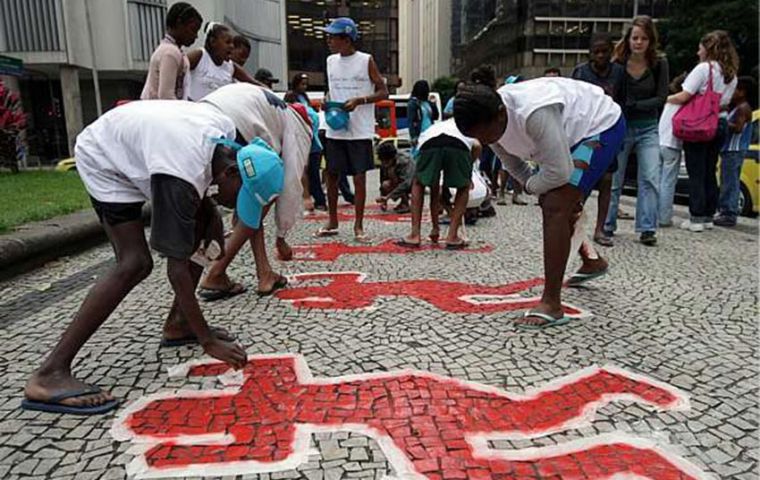MercoPress. South Atlantic News Agency
Police violence in Rio remains as savage as 25 years ago, claims Amnesty
 On 23 July 1993 eight boys who were sleeping rough near Rio's Candelária Church were killed by off duty officers as part of a non official “extermination” policy
On 23 July 1993 eight boys who were sleeping rough near Rio's Candelária Church were killed by off duty officers as part of a non official “extermination” policy The struggle to protect black Brazilian youths from police violence and deliver justice for the victims of the past remains as vital and relevant as ever, Amnesty International said on the 25th anniversary of the Candelária massacre, in which eight young boys were killed by off-duty police officers in Rio de Janeiro.
The murder of the boys, who were sleeping rough near the city’s Candelária Church on 23 July, 1993, sparked international outrage. Yet today Brazilian police and other state agents continue to form “extermination” groups who remain one of the main drivers of violence in Rio.
“Police violence in Rio de Janeiro has been stimulated by the state’s own policies in the 1990s, which rewarded officers based on the number of ‘criminals’ they killed,” said Jurema Werneck, Executive Director of Amnesty International Brazil.
“The repercussions of this inhumane approach are felt to this day. Instead of guiding the police to protect and preserve life, the state has reinforced the notion that the police's role is to kill.”
In the wake of the killings at Candelária, Amnesty International denounced violations by the police and joined the victims’ families’ movement for justice, truth and reparation.
The organization did the same when, just a month later, an “extermination group” formed by police officers killed another 21 people – mainly young black men – in Rio’s Vigário Geral favela.
The police’s violent approach in the 1990s was inflamed by government initiatives such as the “Western Gratification” policy, a financial reward for “bravery” that was measured by the number of people killed; and by official government statements supporting the executions.
Today, some of those members of police “extermination” groups occupy prominent positions in the state apparatus, further bolstering impunity.
In response to unchecked violence by police and other state agents, a movement formed by mothers of victims has blossomed.
Organized during the mourning period and the fight for justice that followed the horrendous killings in the 1990s, the groups have since expanded their support and solidarity networks and gained increased prominence.
The mothers’ detailed monitoring of cases and unrelenting demands for justice have made them key players in the campaign to hold security forces accountable for human rights violations.
They have denounced the endemic racism within the security forces which has fuelled the killings of youths, especially black people from favelas and other poor suburbs.
The mothers’ ultimate goal is to prevent the police violence that took the lives of their children being repeated for other families.
“The mothers have given visibility to issues previously treated with indifference in the national public agenda, and their struggle is vital in pressuring the Brazilian authorities to create a new public security policy that values life,” said Jurema Werneck.




Top Comments
Disclaimer & comment rulesCommenting for this story is now closed.
If you have a Facebook account, become a fan and comment on our Facebook Page!